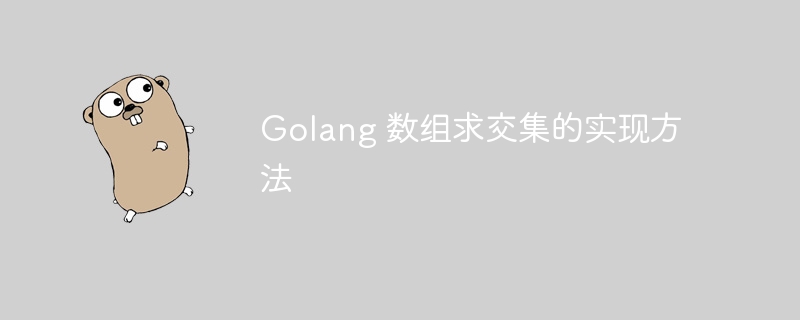
There are two common methods for finding the intersection of arrays in Golang: using the built-in append function, looping to determine whether the element is in another array, and superposing to find the intersection. Use map to exclude duplicate elements and obtain intersections efficiently by creating a mapping table.

Golang array intersection implementation method
In Golang, there are several methods to solve array intersection. This article will introduce the two most common methods: using the built-inappendfunction and usingmap.
Method 1: Use the built-inappendfunction
appendfunction can add elements to an existing array, It is also possible to create a new array. We can use this feature to find the intersection:
func intersection(a, b []int) []int { result := []int{} for _, v := range a { if containsInArray(b, v) { result = append(result, v) } } return result } func containsInArray(arr []int, elem int) bool { for _, v := range arr { if v == elem { return true } } return false }
Method 2: Usemap
Another way to find the intersection is to usemap. Compared with theappendfunction, usingmapis more efficient because it can exclude duplicate elements in O(n) time complexity:
func intersection(a, b []int) []int { m := make(map[int]bool) for _, v := range a { m[v] = true } result := []int{} for _, v := range b { if m[v] { result = append(result, v) } } return result }
Practical case
Suppose we have the following two arrays:
a := []int{1, 2, 3, 4, 5, 6} b := []int{3, 4, 5, 6, 7, 8}
Use theappendfunction to find the intersection:
intersectionAB := intersection(a, b) fmt.Println(intersectionAB) // [3 4 5 6]
UsemapFind the intersection:
intersectionBA := intersection(b, a) fmt.Println(intersectionBA) // [3 4 5 6]
The above is the detailed content of How to implement intersection of arrays in Golang. For more information, please follow other related articles on the PHP Chinese website!
 What are the definitions of arrays?
What are the definitions of arrays? js string to array
js string to array Array initialization method
Array initialization method c array initialization method
c array initialization method How to find the maximum and minimum value of array elements in Java
How to find the maximum and minimum value of array elements in Java How to remove the first few elements of an array in php
How to remove the first few elements of an array in php Summary of java basic knowledge
Summary of java basic knowledge Zero-based Java self-study tutorial
Zero-based Java self-study tutorial



